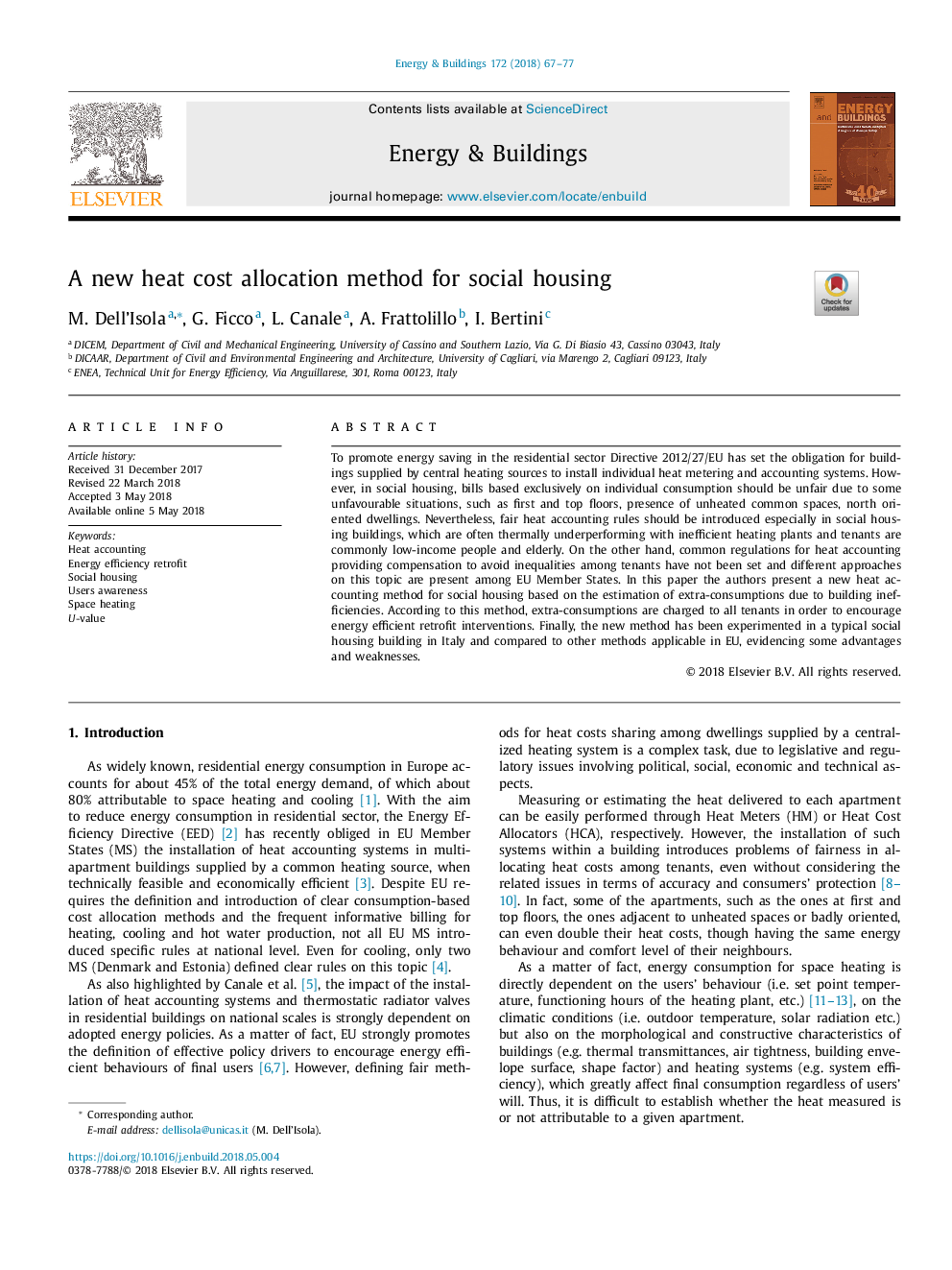| کد مقاله | کد نشریه | سال انتشار | مقاله انگلیسی | نسخه تمام متن |
|---|---|---|---|---|
| 6727336 | 1428918 | 2018 | 11 صفحه PDF | دانلود رایگان |
عنوان انگلیسی مقاله ISI
A new heat cost allocation method for social housing
ترجمه فارسی عنوان
روش جدید تخصیص هزینه گرما برای مسکن اجتماعی
دانلود مقاله + سفارش ترجمه
دانلود مقاله ISI انگلیسی
رایگان برای ایرانیان
کلمات کلیدی
ترجمه چکیده
برای ترویج صرفه جویی در انرژی در بخش مسکونی 2012/27 / اتحادیه اروپا الزام آور برای ساختمان های عرضه شده توسط منابع حرارت مرکزی برای نصب سیستم اندازه گیری حرارت شخصی و سیستم های حسابداری تعیین کرده است. با این حال، در مسکن اجتماعی، صورتحسابهایی که به طور انحصاری بر مصرف فردی هستند، ناشی از شرایط نامساعدی مانند طبقه اول و طبقه بالا، حضور فضاهای غیرمستقیم عمومی، خانه های شمالی است. با این وجود، قوانین حسابداری گرمایش عادلانه باید به خصوص در ساختمان های مسکن اجتماعی معرفی شوند که اغلب با شرایط نامناسب کارآیی گرمایشی کمتری دارند و مستاجران معمولا افراد کم درآمد و سالخوردگان هستند. از سوی دیگر، مقررات معمول برای حسابداری حرارتی، جبران خسارت برای اجتناب از نابرابری در میان مستاجران تعیین نشده است و رویکردهای مختلف در این موضوع در میان کشورهای عضو اتحادیه اروپا وجود دارد. در این مقاله نویسندگان روش جدید حسابداری گرما برای مسکن اجتماعی را بر اساس برآورد هزینه های اضافی به علت ناکارآمدی ساختمان ارائه می دهند. با توجه به این روش، مصرف برق اضافی برای همه مستاجرین به منظور تشویق مداخلات مدرن سازی انرژی به کار می رود. در نهایت، روش جدید در یک ساختمان مسکونی معمول در ایتالیا مورد آزمایش قرار گرفته و در مقایسه با سایر روش های قابل اجرا در اتحادیه اروپا، نشان دهنده برخی مزایا و معایب است.
موضوعات مرتبط
مهندسی و علوم پایه
مهندسی انرژی
انرژی های تجدید پذیر، توسعه پایدار و محیط زیست
چکیده انگلیسی
To promote energy saving in the residential sector Directive 2012/27/EU has set the obligation for buildings supplied by central heating sources to install individual heat metering and accounting systems. However, in social housing, bills based exclusively on individual consumption should be unfair due to some unfavourable situations, such as first and top floors, presence of unheated common spaces, north oriented dwellings. Nevertheless, fair heat accounting rules should be introduced especially in social housing buildings, which are often thermally underperforming with inefficient heating plants and tenants are commonly low-income people and elderly. On the other hand, common regulations for heat accounting providing compensation to avoid inequalities among tenants have not been set and different approaches on this topic are present among EU Member States. In this paper the authors present a new heat accounting method for social housing based on the estimation of extra-consumptions due to building inefficiencies. According to this method, extra-consumptions are charged to all tenants in order to encourage energy efficient retrofit interventions. Finally, the new method has been experimented in a typical social housing building in Italy and compared to other methods applicable in EU, evidencing some advantages and weaknesses.
ناشر
Database: Elsevier - ScienceDirect (ساینس دایرکت)
Journal: Energy and Buildings - Volume 172, 1 August 2018, Pages 67-77
Journal: Energy and Buildings - Volume 172, 1 August 2018, Pages 67-77
نویسندگان
M. Dell'Isola, G. Ficco, L. Canale, A. Frattolillo, I. Bertini,
